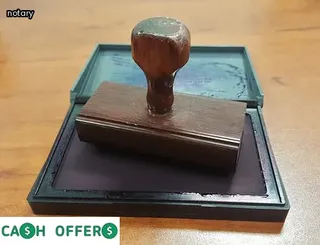A Kentucky quitclaim deed is a legal document used to transfer ownership of real estate from one person or entity to another. Before creating a quitclaim deed, it is important to understand the requirements that must be met in order for the document to be valid.
In Kentucky, there are several documents that must be included in the quitclaim deed, such as the grantor's name and address, description of the property, consideration amount paid for the property, signatures of both parties and witnesses, and notarization. Additionally, it is important to note that only an adult who is legally competent can sign a quitclaim deed in Kentucky.
This document should also include language stating that the grantor has no interest or right of ownership over the property once they have signed the document. Furthermore, when executing this type of deed in Kentucky, both parties must be present at the same time in order for it to be considered valid under state law.
It is also important to ensure that all documents are properly filled out before signing so that there are no issues later on down the road.

Creating a Kentucky Quitclaim Deed for your home is a great way to ensure an efficient and secure transfer of ownership. The advantages of using this type of deed are myriad, beginning with the fact that it requires less paperwork than other types of deed transfers.
Additionally, there are no title searches necessary as with other deeds because the grantor is releasing all interest in the property to the grantee. This makes it much simpler and faster for a transfer to take place.
Furthermore, since it does not provide any warranty or guarantee about the state of the title or property, disputes from third parties are eliminated. Finally, costs associated with transferring ownership via quitclaim deed are typically lower than other types of deeds due to its simplicity and lack of need for title searches or legal counsel.
All in all, choosing to use a Kentucky Quitclaim Deed can be an excellent choice for efficiently transferring ownership of your home.
Title insurance is an essential part of the quitclaim deed process in Kentucky. It serves as a safeguard should any issues arise regarding the title of your property.
Title insurance protects you from potential legal costs and helps to ensure that you are properly transferring ownership of your home. When creating a quitclaim deed, it is important to consider all potential risks and liabilities associated with the transfer of ownership.
With title insurance, these risks can be mitigated or eliminated altogether, allowing for a smooth transition of title to the new owner. Title insurance also covers costs associated with errors or omissions in public records for the home's title history, which can be critical when it comes to resolving disputes related to ownership rights.
In addition, if there are any liens or other encumbrances on the home's title, title insurance can provide coverage for those as well. By considering all these factors when creating a quitclaim deed in Kentucky, you will be able to ensure that you are protected against any unforeseen issues that may arise.

A quit claim deed is a legal document used to transfer ownership of real estate property from one person to another. In the state of Kentucky, a quit claim deed is required in order for the transfer of title to occur.
Creating a quit claim deed for the transfer of your home in Kentucky is easy and can be done in a few simple steps. First, obtain a blank quit claim deed form from your local county clerk's office or from an online source.
Second, complete the form with the current owner's name, address and legal description of the property as well as the name, address and signature of any other parties involved in the transaction. Third, have all parties sign and date the quit claim deed before having it notarized and filed with your local county clerk's office.
Once these steps are completed and approved by the local county clerk, you will officially own your new home in Kentucky.
A quitclaim deed is a legal document used to transfer ownership or interest of real estate from one person to another. In estate planning, the purpose of this type of deed is to ensure that the property will pass quickly and easily from one party to another after death.
It also removes any potential claims of ownership that may exist from other parties. A Kentucky quitclaim deed can be used in a similar manner, allowing the transfer of property between two individuals without any additional fees or delays associated with other types of deeds.
The process for creating a Kentucky quitclaim deed is fairly straightforward, but it's important to make sure all paperwork is accurate and up-to-date before signing. To create a quitclaim deed in Kentucky, you'll need to provide information about who owns the property, what they are transferring and their contact information.
Additionally, you'll need to include information on how much money is being paid for the property, if applicable.

In Kentucky, the two most common types of deeds used in residential real estate transactions are the warranty deed and quit claim deed. The warranty deed is the more commonly used of the two and provides a greater degree of protection to the buyer than a quit claim deed.
A warranty deed guarantees that there are no liens or encumbrances against the property, and it also guarantees that all previous owners have transferred ownership properly. The quit claim deed, on the other hand, merely transfers whatever interest an owner has in a property without any guarantee or assurance by either party as to title or condition.
It does not provide any assurance that there are no liens or encumbrances against the property. In order to create a Kentucky quit claim deed for your home, you must provide several pieces of identifying information about both yourself and your property, such as names, addresses, county where the property is located, legal description of property and tax identification number.
You will also need to include language about how title is being transferred from one person to another. Once these steps are completed correctly, you can register your quit claim deed with your county clerk's office.
Creating a Kentucky Quit Claim Deed for your home is a straightforward process that can be completed in several steps. First, obtain the necessary official documents from the County Clerk’s office and review them to ensure you have all the forms required to complete the deed.
Second, fill out the forms with all relevant information such as the names of both parties involved, legal description of the property, date of transfer and signatures of both parties. Third, take the completed documents to a notary public and have them notarized.
Finally, return to the County Clerk's office and submit all paperwork so it can be recorded with the county records. With these four simple steps, you can easily create a Kentucky Quit Claim Deed for your home.

Completing and signing a Kentucky Quitclaim Deed Form is a straightforward process that can help you transfer ownership of your real estate property. Before beginning, it's important to make sure your deed is properly filled out and notarized.
The first step is to obtain the correct form from your local county clerk or online. The form should include the names of the grantor (the person transferring the title) and grantee (the person receiving the title).
Additionally, it must include a legal description of the property, as well as any consideration (monetary payment) involved in the transaction. Once all information is filled out, both parties must sign the document in front of a notary or witness.
To ensure accuracy, it's important to double-check all information prior to signing and have an attorney review if necessary. After all signatures are collected, submit the deed to your county clerk for recording in order to officially transfer ownership and finalize the transaction.
Creating a Kentucky Quit Claim Deed requires meeting certain legal requirements. Firstly, the deed must be in writing and signed by all parties to the transaction.
Additionally, it must be acknowledged by a notary public and delivered to the county clerk of the county where the property is located for filing. The deed should include a description of both parties involved, including their name and address, as well as a description of the real estate being transferred.
Finally, it should include language that conveys an interest in the property from one party to another without warranties or guarantees about the title. All these elements are necessary for filing a valid quitclaim deed in Kentucky.

A Kentucky Quit Claim Deed is a legal document that transfers ownership of real estate from one individual to another. It is a simple form that is used to transfer the title of property, and requires minimal information.
Unlike other forms that are used in other states, the Kentucky Quit Claim Deed does not provide any warranties or guarantees regarding the condition or title of the property being transferred. This means that if there are any defects regarding ownership or title, they will remain with the new owner after transfer.
Additionally, it does not require a surveyor’s certification as some other forms do. The buyer should conduct sufficient research to ensure they understand all potential risks associated with purchasing a property through a quit claim deed in Kentucky.
When it comes to real estate transactions in Kentucky, there are a number of documents needed for the process. Besides the quit claim deed itself, you may need to provide additional paperwork such as a deed of trust, proof of ownership and other documents depending on the specific situation.
It is important to check with your local government offices in order to find out what documents may be necessary for your particular transaction. In addition, you may want to consult with an experienced attorney or real estate agent who can help you determine what papers you will need and how they should be filed.
Being prepared ahead of time with all relevant documents can save you time and money during the process.

When creating a Kentucky Quit Claim Deed, it is important to avoid common mistakes such as not using the correct language in the deed, failing to include all necessary parties on the deed, and not submitting the deed to the proper county office. Additionally, if any of the information on the deed is incorrect or out of date, it can be considered invalid.
When writing a Kentucky Quit Claim Deed for your home, you must ensure that all details are accurate and up to date. Furthermore, make sure that you have thoroughly read and understood all instructions before filing.
It is also essential to keep copies of the signed document for your own records. Taking these steps will ensure that your Kentucky Quit Claim Deed is valid and will help make sure that the process goes smoothly.
In Kentucky, public records are accessible to anyone who wishes to view them. This includes records related to quit claim deeds, which are documents filed with the county clerk's office that transfer ownership of a property from one person to another.
When someone records a quit claim deed in Kentucky, they can access it by obtaining a copy of the document from the county clerk's office or by searching for it online. The information provided on these public records will typically include the names of the parties involved in the transaction, as well as the date and place of recording.
To make sure that no one has access to viewing public records related to your quit claim deed in Kentucky, it is important to keep all information confidential and take steps such as redacting certain personal details from any online listings. In addition, state laws provide certain protections for private documents like quit claim deeds, which means that even if you make them available for public viewing, only certain individuals are allowed access to them.

When a Kentucky Quit Claim deed is created for a home, it must be processed by the local recorder or clerk. This process typically involves verifying the deed and determining if it meets all legal requirements.
In some instances, the recorder or clerk may also need to ensure that any taxes or other liens have been properly paid prior to accepting the document. Once accepted, the recorder or clerk will enter information from the deed into their office's database, as well as indexing it for public viewing in accordance with state law.
Additionally, these officials may also need to complete additional tasks such as stamping the documents and making copies of them for filing in various courts throughout Kentucky.
When completing a Kentucky quit claim deed form to transfer your home, it is important to understand the role of an attorney. An attorney's expertise is invaluable in helping you to navigate the legal paperwork involved in such a major transaction.
They can assist with reviewing any documents related to the quit claim deed, providing guidance on any potential legal implications and ensuring that all forms are properly completed and filed. Additionally, they will help ensure that the transfer of ownership is legally binding and that all parties involved receive their rights under Kentucky law.
Having an attorney by your side throughout this process can help you feel more secure about making such an important decision for your future.

Creating a quit claim deed for your home in Kentucky can be a great way to transfer ownership quickly and inexpensively, but it’s important to understand the tax implications of such a transfer before you proceed. Quit claim deed transfers are subject to Kentucky's real estate transfer taxes, which are assessed based on the price paid for the property or its appraised value.
Additionally, there may be other state and local taxes depending on the county where the property is located. For example, some counties impose an additional real estate transfer tax of up to 1% of the sale price or appraised value.
When transferring ownership through a quit claim deed, it is important to calculate all applicable taxes and pay them promptly in order to avoid any potential penalties or interest charges. Further, if you are considering selling your home at some point, you should also be aware of Kentucky's capital gains tax rules and how they might affect any profits from the sale.
By taking all necessary steps in advance, such as calculating applicable taxes and understanding capital gains rules, you can ensure that your quit claim deed transfer goes as smoothly as possible.
Creating a Kentucky Quit Claim Deed is a fast and easy way to transfer ownership of real estate. By creating one, the grantor transfers their legal interest in the property to another person.
Title Insurance Policies provide important protections for those who create and use Quit Claim Deeds in Kentucky. Title Insurance protects against claims or defects that may exist in the title that are unknown to the buyer, such as undisclosed heirs, prior liens, or other parties claiming an interest in the property.
It also covers costs associated with defending against any claims that may arise from these issues. Title Insurance also helps protect buyers from fraud and forgery, providing coverage if someone attempts to sell a piece of property they do not legally own.
A title insurance policy ensures that both the buyer and seller can be sure of clear title when transferring ownership using a quit claim deed in Kentucky.

A Kentucky Quit Claim Deed is a legal document that transfers ownership of real estate from one party to another. When creating a Quit Claim Deed for your home, it's important to understand the legal ramifications of transferring ownership.
The party granting the deed is referred to as the ‘Grantor’ and the party receiving the deed is called the ‘Grantee’. Determining liability after real estate transfers through KY Quit Claim Deeds can seem daunting, but there are certain steps you should take to ensure that all parties involved are legally protected.
Firstly, you'll need to make sure that all information on the Deed is accurate and up-to-date. This includes verifying that all names listed on the deed are current and correct, as well as ensuring that any changes in ownership have been properly documented.
Additionally, make sure that any mortgages or other liens on the property have been released before transferring ownership via a KY Quit Claim Deed. Once this has been done, both parties must sign and acknowledge the documents in front of witnesses or notaries public, as well as having them filed with the local county recorder's office.
It's also important to note that while a KY Quit Claim Deed does transfer title of property from one person to another, it doesn't afford any protection against potential debts or liabilities associated with prior owners which may become due in future years; this means that if there are any unpaid taxes or liens attached to the property when it is transferred via Quit Claim Deed, these liabilities remain with the Grantor unless otherwise noted in writing. Therefore understanding liability requirements prior to creating a Kentucky Quit Claim Deed is essential for protecting your rights and assets when transferring real estate in Kentucky.
Creating a Kentucky Quit Claim Deed for your home can be a great way to protect your homestead from creditors. It is important to understand the process and the different forms of protection available.
A Quit Claim Deed is one of the most common ways individuals in Kentucky use to protect their homestead. To create the deed, you must first identify your property and provide a legal description of it.
Once this step is complete, you will need to fill out the appropriate paperwork provided by your county clerk's office and then have all parties involved sign it in front of a notary public. After that, you may need to file the deed at the county clerk’s office, depending on local ordinances.
Finally, it is important to keep records of all documents related to the deed as well as any payments or transfers associated with it for future reference or proof should any issues arise down the road. Taking these steps when creating your Kentucky Quit Claim Deed will ensure that your homestead is properly protected from creditors and other claims against it.

Creating and filing a Kentucky quit claim deed for your home can be a costly endeavor. The cost of the actual deed form may vary, but is typically between $10 and $25 depending on where you purchase it.
In addition to the form, you may be required to pay a nominal fee to have it notarized as well as any applicable recording fees set by your local county clerk’s office. These fees can range anywhere from $10-$35 depending on the county.
You may also need to hire an attorney to review and advise on the document, which will add additional costs. Furthermore, if your property is part of a mortgage or lien, you may need to notify all parties involved and could incur additional legal fees in doing so.
If you choose to go through with filing a quit claim deed in Kentucky, you should expect some level of expense associated with it.
Transferring a property title to a family member in Kentucky is easy when you know the steps involved. A Kentucky Quit Claim Deed is the most common way to transfer ownership of real estate from one person to another.
To create your own Quit Claim Deed, you'll need to gather some basic information about the property, including its legal address and the name of the current owner. Once this information is gathered, you can download a template that outlines all of the necessary information needed for a valid quit claim deed.
When filling out your deed, be sure to include accurate details about both parties involved and sign it in front of two witnesses who will also need to provide their signatures as well. Finally, take your completed deed to a county courthouse or register of deeds office where it will be recorded and officially transferred over to your family member's name.
Following these steps will ensure that you have successfully created a Kentucky Quit Claim Deed for transferring ownership of your home without any issues.

Yes, you can make your own quit claim deed in Kentucky. In most cases, this is a relatively straightforward process that does not require the assistance of an attorney.
Firstly, you need to obtain and complete a quit claim deed form. All parties involved must sign the document in front of a Notary Public or two witnesses who are over 18 years old.
The deed must include the grantor's name and address as well as the grantee's name and address. Additionally, it should include information about the property being transferred such as its legal description, address, county where it is located and the amount of consideration paid for it.
Once all signatures have been collected on the document, it needs to be recorded in the County Clerk’s office in which the property is located within 30 days of execution date to be legally valid. After recording has taken place, you may then receive a certified copy of your quit claim deed from the County Clerk’s office for your records.
Adding someone to your deed in Kentucky is a simple process that can be accomplished by creating a Kentucky quit claim deed. A quit claim deed is a legal document that transfers ownership of real property from one person or entity to another without any warranties regarding the title.
To create a Kentucky quit claim deed, you must first obtain the necessary forms from the county clerk's office in the county where the property is located. Next, fill out all information required on the form, including names and addresses of both parties involved in the transaction and an accurate description of the property being transferred.
After completing all necessary paperwork, both parties must sign and notarize it before submitting it to the county clerk’s office for recording. Once recorded, your deed will be officially changed to reflect the new owner and their interest in your home.
Removing someone from a deed in Kentucky requires the creation of a Quit Claim Deed. To create a Quit Claim Deed in Kentucky, you will need to acquire the appropriate forms and fill them out correctly.
This deed must include all parties involved, including yourself as the grantor and the person being removed as the grantee. The document should also include details about your property, such as its address and legal description.
Once you have completed your Quit Claim Deed, it must be signed by all parties involved and notarized by an authorized public notary. Finally, you will need to submit your deed to the county clerk's office where it can be officially recorded with the state.
By doing this, you will have successfully removed someone from your deed in Kentucky.
A: To execute a quit claim deed on a house in Kentucky, the grantor must sign the deed and have it notarized. The deed should include the grantee's name, legal description of the property, and an express statement that the grantor is conveying all of their interest in the property without any warranties or representations of title. This includes no warranty or breach of warranty of title as well as no warranties or guarantees provided by the grantor.
A: A married couple in Kentucky can complete a quit claim deed by both parties executing the deed document, having it notarized, and then filing it with the county clerk's office along with any required court documents or a final marital decree.

A: To do a quit claim deed on a house in Kentucky, you must first contact the local Tax Assessor's Office to determine what taxes and other fees may apply. You will then need to complete any necessary paperwork for the deed transfer through the Assessor's Office. Once all documents are filed and fees paid, you will receive confirmation of the deed transfer from the Assessor's Office.
A: In order to transfer property in Kentucky using a Quit Claim Deed, the deed must be signed and acknowledged by all parties involved and it must contain an accurate legal description of the property. Additionally, it is necessary to have the deed notarized and recorded with the local county Clerk's office. The deed must also meet all other requirements set forth under Kentucky law.
A: In Kentucky, to complete a quit claim deed involving joint tenants, tenants by the entirety, or co-ownership of real estate, all parties must sign and acknowledge the deed in front of a notary public and have it recorded with the county clerk's office. The signatures must be witnessed by two competent witnesses. Each tenant should also provide proof of their identity with a valid photo ID.

A: If the property is held by joint tenants, tenants by the entirety, or as co-owners, a quit claim deed must take into account any existing Life Estate and Life Tenant arrangements. The presence of these legal interests may require an additional step to be taken before the transfer of the property can be completed.
A: To transfer Ownership Interest in a house in Kentucky using a quit claim deed, the property must be owned by joint tenants, tenants by the entirety, or as co-owners. The Property Owner will need to complete the deed, have it signed and notarized, and then submit it to the county clerk's office for recording.
A: To create a Quit Claim Deed for a house in Kentucky when the property is owned by joint tenants, tenants by the entirety, or as co-owners, each owner must sign and notarize the deed. The deed should be filed with the County Clerk's office in the county where the property is located.

A: To complete a quit claim deed for a home in Kentucky that is jointly owned by tenants, tenants by the entirety, or as co-owners, all parties must sign off on the deed and have it notarized. The deed must also be properly filed with the county clerk's office where the property is located.
A: The legal requirements to complete a quit claim deed on a house in Kentucky when the property is jointly owned by tenants, tenants by the entirety, or as co-owners require that all parties comply with applicable state contract statutes. The quit claim phrase must clearly describe all owners and be properly executed to be legally binding. Additionally, all owners must have valid reasons for signing such a document.
A: The steps for completing a quit claim deed for a house in Kentucky if the property is owned by joint tenants, tenants by the entirety, or as co-owners are to gather the necessary documents, fill out the quit claim deed form, sign and notarize the quit claim deed, and record the quit claim deed with the county clerk.